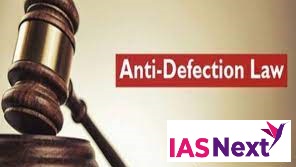CURRENT AFFAIRS
Get the most updated and recent current affair content on Padhaikaro.com
What is Anti-defection law?
- IAS NEXT, Lucknow
- 07, Dec 2021

Reference News:
The Congress Party has written to the Speaker, Meghalaya Legislative Assembly seeking disqualification of 10 of the 12 MLAs that recently deserted the Party to join the All India Trinamool Congress (AITMC).
Why the 10th schedule might not apply here?
The 10th Schedule of the Indian Constitution commonly referred to as the Anti-defection Act says that disqualification on ground of defection will not apply in case of a split.
- Where a member of a House claims that he/she and any other members of his/her legislature party constitute the group representing a faction which has arisen as a result of a split in the original political party and such group consists of not less than two-thirds of the members of such legislature party, he/she shall not be disqualified.
- From the time of such split, the faction shall be deemed to be the political party to which he/she henceforth belongs.
Relevance: the Tenth Schedule of the Indian Constitution:
Popularly known as the anti-defection law.
- It specifies the circumstances under which changing of political parties by legislators invites action under the law.
- It was added to the Constitution by the 52nd Amendment Act.
- It includes situations in which an independent MLA, too, joins a party after the election.
The law covers three scenarios with respect to shifting of political parties by an MP or an MLA. These include:
- When a member elected on the ticket of a political party “voluntarily gives up” membership of such a party or votes in the House against the wishes of the party.
- When a legislator who has won his or her seat as an independent candidate joins a political party after the election.
In the above two cases, the legislator loses the seat in the legislature on changing (or joining) a party.
- Relates to nominated MPs. In their case, the law gives them six months to join a political party, after being nominated. If they join a party after such time, they stand to lose their seat in the House.
Matters related to disqualification:
- Under the anti-defection law, the power to decide the disqualification of an MP or MLA rests with the presiding officer of the legislature.
- The law does not specify a time frame in which such a decision has to be made.
- Last year, the Supreme Court observed that anti-defection cases should be decided by Speakers in three months’ time.
However, Legislators may change their party without the risk of disqualification in certain circumstances. Exceptions:
- The law allows a party to merge with or into another party provided that at least two-thirds of its legislators are in favour of the merger.
- On being elected as the presiding officer of the House, if a member, voluntarily gives up the membership of his party or rejoins it after he ceases to hold that office, he won’t be disqualified.
Loopholes in the law:
Those against say that voters elect individuals in the election and not parties and hence the Anti-Defection law is infructuous.